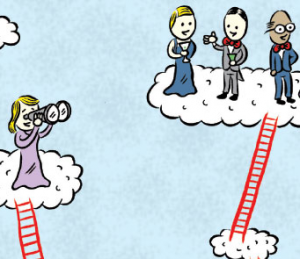If you are born in the Western world rather than Africa today, it is likely that you will not suffer famine in your lifetime. If you are born in England, your life expectancy will be higher than someone born in Mali. If you are born into a family where both your parents have university degrees, it is very likely that you will have access to higher education as well.
Small differences in life such as your place of birth, nationality, your name and your family make huge differences to how your life is lived.
It is very clear that not everybody is born with the same kind of opportunities and prospects. It is the balance of nature—and it is not very fair.
Social mobility is a big challenge for every country today. A book written by Richard Wilkinson and Kate Pickett concludes that more equal societies almost always do better than others. Their study discovers that there is an inverse relationship between income inequality and intergenerational mobility. Countries with less income inequality, such as Denmark, Sweden and Finland, have some of the greatest mobility, whereas countries with high income inequality, such as Chile and Brazil, have some of the lowest social mobility.
So much talent is wasted because they haven’t been given enough opportunity to show what they can achieve.
For example, George Soros would have been one of the wasted talents, but he was lucky enough to receive an education at LSE.
He subsequently tried his luck in securing employment in England, but was offered only simple jobs rather than his dream investment banking job. Because he did not come from a certain family or circle, he could not establish his dream in England, and so flew to the US to accomplish his dreams.
Today he is one of the greatest philanthropists.
Given that we cannot completely eliminate these inequalities, how can we help the underprivileged to move up the ladder?
No matter what, we have to subsidise education. Children who come from poor families have to make it to good schools if they have the right attitude and skills. Without allowing underprivileged kids access to education, it is almost impossible to speak about social mobility.
I think Singapore is a very good example. Everyone can go to a public school and the monthly fee varies from free to six Singapore dollars if you are a Singaporean citizen. More importantly, Singapore is one of the best countries for your child to be educated, according to the latest PISA results.
There is no guarantee that all kids can make it—but the probability of climbing the ladder significantly increases with a good education.
The legendary investor, Jim Rogers, lives in Singapore with his family and he chose for his daughter to study at a public school rather than a private school.
Social mobility is not only something that helps people climb the ladder, but it is also an insurance against rises in crime and is a bodyguard for a peaceful world.
It is not easy to subsidise a good level of education for everyone and it is very costly, but it is not more costly than the cost of rising crime, of unhappy communities and of pessimistic futures.
Finally, no matter how smart you are, if you are financially well off, it is very likely that you will take it easy. Social mobility is also good for innovation, competition and the promotion of growth.
Hamdi Ulukaya, owner of Chobani yoghurts, is a recent good example of social mobility. A Turkish citizen of Kurdish descent, he was lucky enough to study at Ankara University and lucky enough to go to the US for his English studies. He took a major risk in acquiring a large, defunct yoghurt factory in New York.
Ulukaya’s net worth is USD 1.4 billion as of 2014 and he has pledged USD 700 million to refugees of the Syrian civil war.
It is hard to prove, but I believe people whom you help to move up social ladder tend to help other people as well—just like George Soros and Hamdi Ulukaya.
All the best from Singapore.
Sukru Haskan
Twitter: @sukru_haskan
